I am the MD of the Japan division of a US/UK media advertising agency in Tokyo. We are part of a larger network of group companies which includes some of the world's biggest and most prominent marketing and branding research outfits. One of the verticals our client portfolio heavily rests in is travel - we probably have a little too many airline, hotel group, OTA, and board of tourism clients than a healthy portfolio mix should contain, but it has focused us on the value of branding for destination cities.
And among Japanese, Chinese, Korean, and Taiwanese travelers, Boston has positive brand metrics through the roof (depending on seasonality, Top 5 in the entire Western Hemisphere), frequently underpinned by the prestige Boston schools carry in Northeast Asia. To be clear: it's not specifically Harvard/MIT which drives the Boston brand uplift. It's broader than that. It's the perception that Boston as a whole espouses the importance and the values of higher education, with qualitative paneling producing quotes similar to "My sister's husband's cousin went to Simmons and she is the most successful person on that side of the family - Boston made her what she is today." More times than not, it's the second and third tier schools which get named in qual panels, which stands to reason; not that many people make it into Harvard or MIT.
There are many reasons why Chinese tycoons are buying Millennium Tower top floor units and not dropping the same $millions site unseen on units in Philadelphia or Dallas, but a considerable part of that purchase making equation is informed by Boston's brand, and that brand is built on the back of the higher education regime in its entirety.

